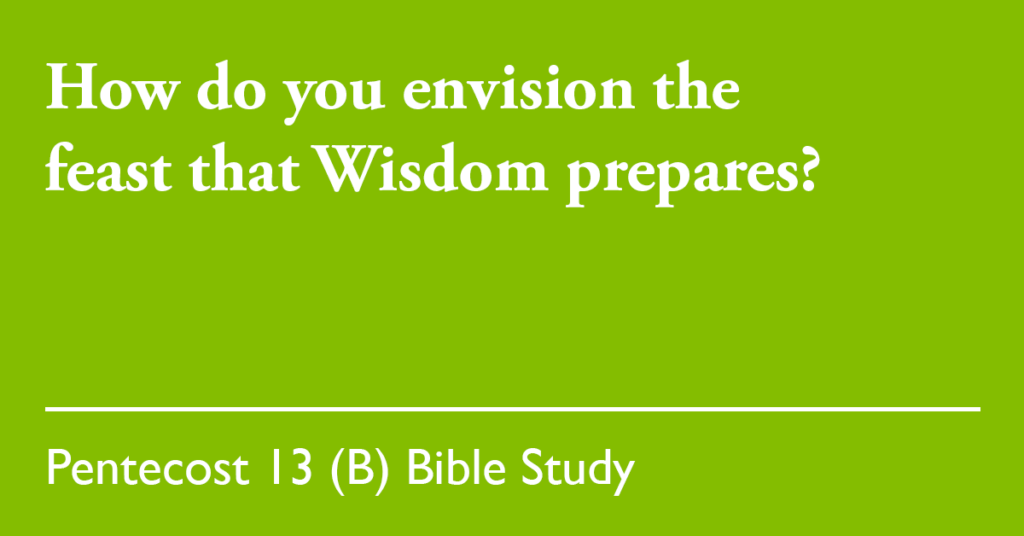This page is available in: Español
Bible Study: Pentecost 13 (B) – August 18, 2024
August 18, 2024
Note: During the 2024 Season after Pentecost, Sermons That Work will use Track 2 readings for sermons and Bible studies. Please consult our archives for many additional Track 1 resources from prior years.
RCL: Proverbs 9:1-6; Psalm 34:9-14; Ephesians 5:15-20; John 6:51-58

Proverbs 9:1-6
In this passage, we receive an invitation from Wisdom herself – probably a better dinner invitation than many of us have received. From her vast stores of riches, from her sumptuous home, she bids all draw near to partake of her generosity. The invitation is not exclusive, either – to everyone, the call goes out: “Come in, come in!” There’s but a slight catch here: by joining the feast, by putting aside our follies, by turning from the way of death, we will be forever changed. This seems familiar – perhaps a type that foretells of our Lord’s call to the whole world: “Come, eat of my bread and drink of the wine I have mixed.” In joining the feast, we, too, are changed.
- How do you envision the feast that Wisdom prepares?
Psalm 34:9-14
Fear can be a hard concept for us to apply to God, yet here we are, instructed in the first verse to fear him! Why ought we tremble when the one who lovingly created us and cares for us – the one who set the stars in the sky and still cares for the sparrow – why should we fear him? The Hebrew root word in this text “יָרֵא,” (pronounced ya-RAY) can indeed mean “to fear” – we see that same form when Adam is confronted by God in the Garden of Eden, and the inverse when the word of the Lord comes to Abram in Genesis 15:1, telling him to not be afraid. But perhaps a better way for us to understand the term in this context is not boot-shaking fear, but deepest reverence, awe, honor, and respect. How can we show such reverence to God? By telling the truth in love, but reorienting ourselves from evil to good behavior, by seeking and working for peace.
- Read the psalm again with this new approach to the word translated as “fear”.
- How would our daily lives be different if we lived in the deepest reverence, awe, and honor toward the Lord?
Ephesians 5:15-20
Paul’s advice is good enough on its own, but knowing a little bit about the context in which he’s writing will be helpful. Ephesus was a center of the cult of Dionysus. For those not up on their Greek mythology, Dionysus was also known as Bacchus, from whose name we get the word “bacchanal” – a wild party characterized by extreme drunkenness and orgies. For devotees of this sect, communing with God by necessity included getting extraordinarily drunk on wine and, shall we say, more. This is ridiculous to Paul; to connect with the king of the universe is to lead a life of praise, of gratitude, of singing. While people can, of course, enjoy themselves, there is nothing pleasing to God about an unbridled temperament, foolishness, or licentiousness.
- Where have you felt like you’ve communed with God? What was the setting?
John 6:51-58
How interesting that the full theme of today’s readings is revealed in the Gospel: what we consume does, in some sense, matter. We are to join Wisdom at her table, partaking in her sumptuous food and drink. We are to revere more than all others our Lord, and in doing so, will never suffer hunger or let evil pass our lips. We are to encounter God not in self-indulgence or drunkenness, but in sweet songs of praise. And we are to be truly refreshed not by over-indulgence, but in the bread and wine that walked (and walks!) among us.
- Can you imagine how shocked Jesus’ audience would be, hearing this teaching?
- Which of today’s readings was most impactful to you?
This page is available in: Español
Don’t forget to subscribe to the Sermons That Work podcast to hear this sermon and more on your favorite podcasting app! Recordings are released the Thursday before each liturgical date.
Receive Free Weekly Sermons That Work Resources!
This page is available in: Español


